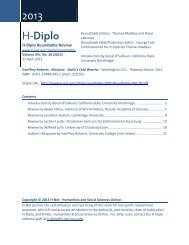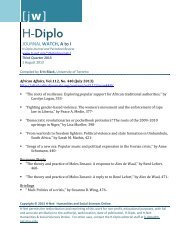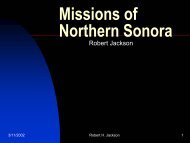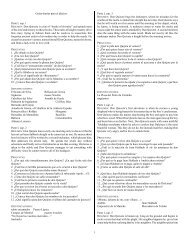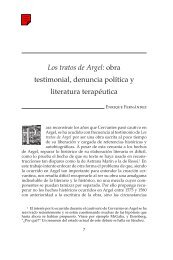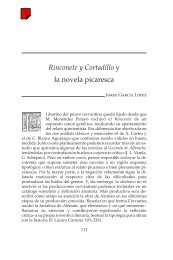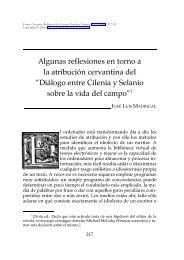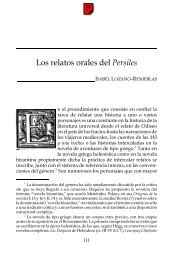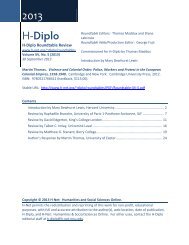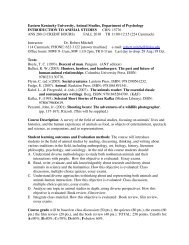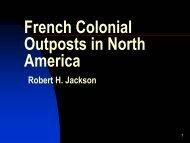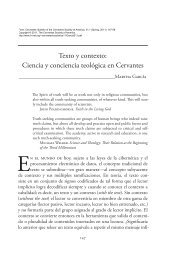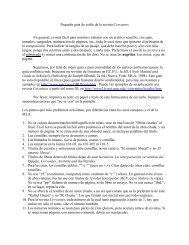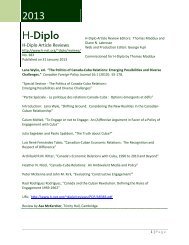H-Diplo Roundtables, Vol. XIV, No. 29 (2013) - H-Net
H-Diplo Roundtables, Vol. XIV, No. 29 (2013) - H-Net
H-Diplo Roundtables, Vol. XIV, No. 29 (2013) - H-Net
You also want an ePaper? Increase the reach of your titles
YUMPU automatically turns print PDFs into web optimized ePapers that Google loves.
H-<strong>Diplo</strong> Roundtable Reviews, <strong>Vol</strong>. <strong>XIV</strong>, <strong>No</strong>. <strong>29</strong> (<strong>2013</strong>)<br />
and macho posturing, a modus vivendi emerged in which both Washington and Moscow<br />
could claim a measure of victory. Khrushchev, although seemingly prepared to challenge<br />
the West everywhere from Cuba to the Congo, accepted Kennedy’s assertion that “Laos is<br />
not so important as to get us as involved as we are” and joined the American president in<br />
issuing a statement affirming mutual “support of a neutral and independent Laos” (268). I<br />
also address Roving Ambassador Averell Harriman’s formal and off-the-record<br />
negotiations with Georgi Pushkin, head of the Soviet delegation at the Geneva Conference,<br />
and the “Pushkin-Harriman understanding” that resulted from those meetings, an<br />
arrangement whereby the Soviets would “police” the communist bloc insofar as Laos was<br />
concerned and the Americans would keep non-communist nations from violating Lao<br />
neutrality (261). My unfamiliarity with Césari’s work did cause me to overlook the<br />
connection between the Soviet airlift in the Plain of Jars and the simultaneous U.S. airlift in<br />
Berlin, and I concede Goscha’s point that “[s]uch a linkage mattered,” but I do not think it<br />
mattered enough to weaken my argument about Kennedy’s cultural preconceptions playing<br />
the predominant role in his Laos policy.<br />
<strong>No</strong>te that I wrote “predominant,” not “exclusive.” Universe Unraveling does not advance a<br />
single-issue explanation. Rather, it acknowledges that American policymakers in the 1950s<br />
and early 1960s were impelled and constrained by a number of factors, including the oftinvoked<br />
logistical concerns, but that, in the final analysis, the element that tipped the scales<br />
in favor of Lao neutralization was the poisonously negative stereotype of the Lao accepted<br />
by virtually every upper and middle echelon official in the White House, State Department,<br />
and Pentagon. Absent that longstanding cultural construction, I contend, Washington<br />
would have pursued a different policy toward Laos. Kennedy would have rejected<br />
communist participation in the Royal Lao Government (RLG), the American military<br />
presence in Laos would have swelled as it did in South Vietnam, and Lao strongman<br />
Phoumi <strong>No</strong>savan might well have become the “Winston Churchill of Southeast Asia” instead<br />
of Diem.<br />
As for the other diplomatic agendas—French, British, Chinese, and <strong>No</strong>rth Vietnamese—that<br />
Goscha considers essential to establishing the “wider context” of the Laos crisis: no doubt I<br />
could have examined these in greater depth, but I do not ignore them. I explore the<br />
gradual, grudging transition from French to American stewardship in Laos as Washington<br />
implemented the so-called “Heintges Plan”—named after Brigadier General John Heintges,<br />
director of the Programs Evaluation Office (PEO)—near the end of Eisenhower’s second<br />
term. This was not an amicable handing over of the baton; French officers recoiled at the<br />
prospect of being supplanted by a U.S. military mission, but financial pressures forced the<br />
government of Charles de Gaulle to phase down French commitments overseas, and the<br />
French gave way with bad grace. I moreover address the high-profile meeting between<br />
Kennedy and de Gaulle at which the French President flatly declared that “France would<br />
not intervene” even if the communist Pathet Lao made a move to seize the entire country<br />
(265). My discussion of London’s role is admittedly limited to a few passages detailing<br />
British support for neutralist leader Souvanna Phouma. I wish Universe Unraveling hadn’t<br />
already been in proofs when Nicholas Tarling’s study Britain and the Neutralization of Laos<br />
25 | P age



